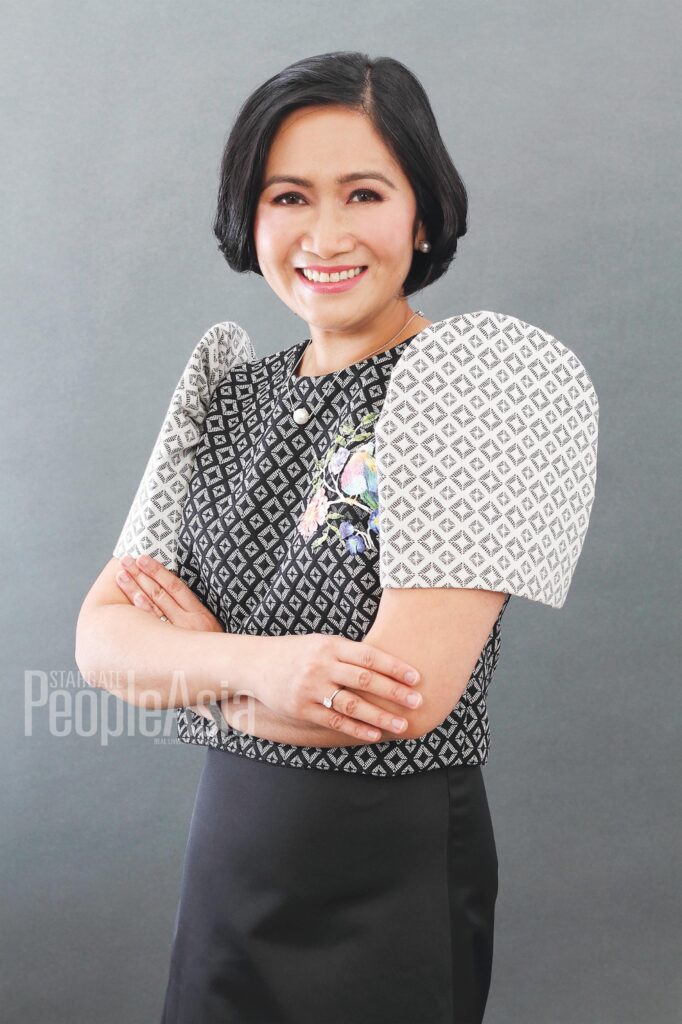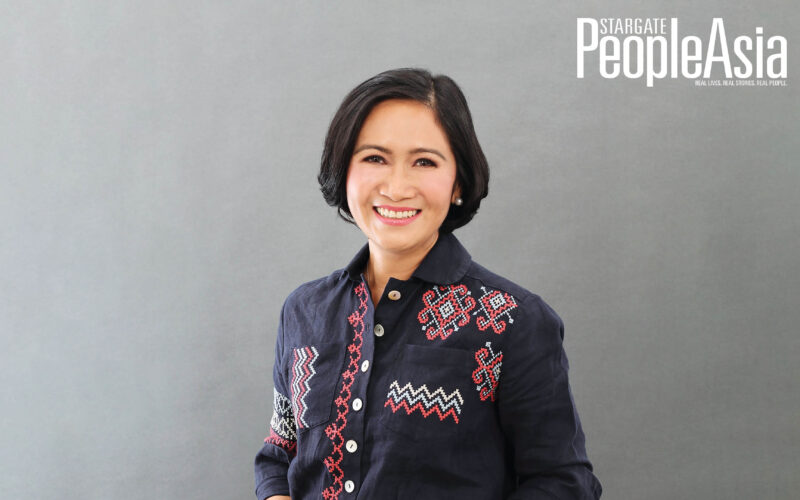BY KAP MACEDA AGUILA
The first woman at the helm of Shell Pilipinas makes sure that the energy giant does its part in helping the Philippines reach a greener and more sustainable future.
Some months back, Pilipinas Shell Petroleum Corp. formally changed its name to Shell Pilipinas Corp. or SPC. The rechristening was not whimsical. “Our name change to Shell Pilipinas reflects our commitment to provide for the current needs of our customers while playing a key role in the energy transition. We are going beyond petroleum by investing in renewable energy, electric mobility, non-fuel products and services and other new technologies; in step with society. Our goal is to be a provider of more and cleaner energy solutions, catering to the evolving needs of the market in the Philippines.”
This is according to company president and chief executive Lorelie Quiambao Osial, who also chairs Shell companies in the country.
She assumed both posts in December 2021, becoming Shell’s first lady at the helm. Lorelie had done so in the throes of the COVID-19 pandemic, back when things were very different and a lot more uncertain and in flux across industries. “Before the pandemic, everyone had their great forecasts and predictions on where we’re all headed. Somehow, the pandemic changed that,” Osial had said in a previous interview with this writer. “That will continue to evolve.”
And even as she acknowledged those tough days, telling PeopleAsia that “assuming work during the peak of COVID-19 was a challenge,” she quickly added, “It also presented us with opportunities to innovate and adapt to the changing needs of our customers and stakeholders.”
The pivot came in the form of taking advantage of what Osial calls “digital opportunities,” in addition to exploring the burgeoning area of sustainable energy solutions. The overarching aspiration, she maintained, is to put the company in prime position to meet the “current and future needs of its ever-growing base of customers.”
To this end, Shell is “actively investing in digital and technology advancements, renewable energy sources, and focusing on innovation to drive growth, provide reliable and high-quality products and services, and play a significant role in energy transition at pace with society.”
The energy transformation aligns with a global aspiration as elucidated in COP28 or the United Nations Climate Change Conference (hosted by Dubai in the United Arab Emirates). Almost 120 countries have already signed a pact to triple renewable power generation capacity to 11,000 GW, and double the energy efficiency this decade.
In addition, 50 oil and gas companies have committed to reach “near zero-methane emissions” by 2030, and formulate a plan to achieve it by 2025 — and to achieve net zero greenhouse gas emissions from their operations by 2050.
On its global website, Shell reports methane to be a “potent greenhouse gas” with a much higher global warming impact than carbon dioxide. “Efforts to address climate change therefore require the industry to reduce both deliberate and unintended methane emissions from production to the final consumer,” it added. Shell has committed to bringing forward the target to eliminate “routine gas flaring from its upstream-operated assets from 2030 to 2025.” The goal by 2030 is to “halve the absolute emissions from operations, compared to 2016 levels on a net basis.”
In concert with a deliberate shift to more sustainable, planet-friendly energy, the world is also seeing the continued increase of electrification of mobility.
Shell is privy to this, and is actually continuing to roll out its Recharge facilities, which it debuted in the country in July 2022. “The Philippines is, indeed, at the onset of energy-transition phase, and we are seeing an increasing demand for electrified vehicles, including battery electric vehicles,” declares Osial. “We are committed to meeting this demand by expanding our network of Recharge stations. We are also working with automakers and other stakeholders to develop the electric vehicle charging infrastructure in the Philippines.”
The executive — who wields a BS Accountancy degree from Silliman University, is a certified public accountant, and holds a Master of Business degree from the University of Western Australia — had previously mentioned the need for Shell to be on pace with the “energy appetite” of the markets where it operates. We ask her what she’s seeing in the Philippines.

“The energy appetite of the Philippine market is growing,” Osial reports. “And we are seeing opportunities towards cleaner and more sustainable energy sources. We are well positioned to meet this increasing demand with our diverse portfolio of products and services. With a large population and a rapidly growing economy, the energy sector is thriving. There are opportunities in areas such as LNG (liquefied natural gas), power generation, transmission, distribution and off-grid islands. Shell Pilipinas is committed to be at pace with the market’s energy needs and contributing to the development of the energy sector and the economy of the Philippines.”
The name change was also an opportunity for Shell to broaden its articles of incorporation here to include the sale of services related to electric charging — surely an anticipatory move into the burgeoning electrified mobility market.
“As a response to the emerging demand for EVs in the country and in alignment with SPC’s commitment to provide for the current and future needs of our customers, which includes decarbonizing mobility through more alternative and sustainable mobility options for customers, Shell Pilipinas recently opened a Shell Recharge site at the Shell Mobility TPLEX junction site in Rosario, La Union,” shares Osial. “This site offers services to alleviate the anxiety of electric vehicle (EV) riders traveling up north. It aims to establish an EV highway equipped with fast-charging infrastructure along the country’s main routes.”
By the end of 2023, Shell Pilipinas would have sunk in P3 or P4 billion for its expansion plans. Osial reveals that the focus is on “earnings over growth where (the company) will continue to invest selectively.”
Around 60 percent of this sum will go to the company’s “mobility business, which includes transforming its retail stations into mobility destinations.” Shell will obviously continue with its drive to evolve its outlets from the traditional gas stations of old into ones with innovative products, services and amenities,” with compelling customer offerings strategically located in its nationwide network of outlets such as Shell Café, Shell Deli2Go, Shell Helix Oil Change+, Shell Recharge, Shell FuelSave and Shell V-Power.
Shell’s board of directors also approved a proposal to sell technical services related to the company’s lubricants business to non-buyers to generate more revenue. “This will allow us to broaden our services and offers and expand our reach into new markets,” explains the CEO. “For example, we can now offer our lubricant testing and analysis services to other businesses, such as automakers and airlines. We are also planning to launch an upcoming service that focuses on optimizing industrial lubrication systems for machinery and equipment.”
Being at the steering wheel of a company of such girth — and at the leading edge of change at that — she insists that work-life balance is something that she continues to give value to. It is an aspiration she works on with her own family and her Shell team.
“This entails a regular review and reflection of what is on my plate in the different roles that I play, prioritization, managing not just my time but more importantly my energy, setting boundaries and making sure I also have time to reflect, recharge and refresh,” she admits.
At the end of the day, “you cannot give what you do not have,” she stresses. “I am grateful for all the support of my family, my friends and the teams that I work with. I would not be able to do what I’m supposed to and need to without them.”






